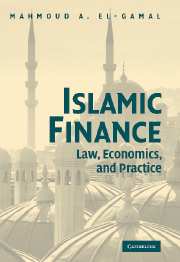Book contents
- Frontmatter
- Contents
- List of Illustrations
- Preface
- Glossary and Transliteration
- 1 Introduction
- 2 Jurisprudence and Arbitrage
- 3 Two Major Prohibitions: Riba and Gharar
- 4 Sale-Based Islamic Finance
- 5 Derivative-Like Sales: Salam, Istisna', and 'Urbun
- 6 Leasing, Securitization, and Sukuk
- 7 Partnerships and Equity Investment
- 8 Islamic Financial Institutions
- 9 Governance and Regulatory Solutions in Mutuality
- 10 Beyond Shari'a Arbitrage
- Conclusion
- Notes
- Bibliography
- Index
10 - Beyond Shari'a Arbitrage
Published online by Cambridge University Press: 06 July 2010
- Frontmatter
- Contents
- List of Illustrations
- Preface
- Glossary and Transliteration
- 1 Introduction
- 2 Jurisprudence and Arbitrage
- 3 Two Major Prohibitions: Riba and Gharar
- 4 Sale-Based Islamic Finance
- 5 Derivative-Like Sales: Salam, Istisna', and 'Urbun
- 6 Leasing, Securitization, and Sukuk
- 7 Partnerships and Equity Investment
- 8 Islamic Financial Institutions
- 9 Governance and Regulatory Solutions in Mutuality
- 10 Beyond Shari'a Arbitrage
- Conclusion
- Notes
- Bibliography
- Index
Summary
We have seen a number of examples in the previous chapters illustrating how nominate contracts in classical Islamic jurisprudence can be used to synthesize almost any contemporary financial transaction. The art of Shariʿa arbitrage consists of identifying a captive market, with religious injunctions that forbid a given set of financial products and services, and synthesizing those products and services from variations on those premodern nominate contracts. Indeed, the governor of the Bahrain Monetary Agency admitted this nature of Islamic finance in a recent speech:
“Islamic banking and other Islamic financial institutions are rapidly approaching a crossroads,” Sheikh Ahmad bin Mohammad Al Khalifa told the opening session of a conference on Islamic Banking and Finance in Manama [in late February 2004]. “Islamic banks have grown primarily by providing services to a captive market, people who will only deal with a financial institution that strictly adheres to Islamic principles.”
In this regard, the potential for Shariʿa arbitrage seems unlimited. Conventional financial products and services will continue to grow indefinitely, thus providing the Shariʿa arbitrageur an unlimited scope for synthesizing subsets of the ever-growing set of financial choices available to conventional customers. We shall illustrate briefly in this chapter how some of the financial products previously considered impossible to synthesize have in fact been offered in recent years.
- Type
- Chapter
- Information
- Islamic FinanceLaw, Economics, and Practice, pp. 175 - 189Publisher: Cambridge University PressPrint publication year: 2006



